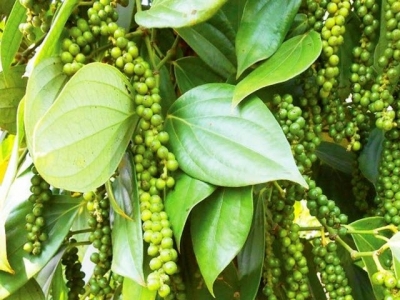Pepper prices hit record low, hard to recover

Prices of agro-products go up and down periodically as per the rule of supply and demand in the market. Therefore, there is no surprise when pepper prices go down because pepper prices maintained high in a long time and there is oversupply.
Pepper prices dropped to below VND60,000 ($2.6) a kilogram last week but experts warned a decrease to VND50,000 per kilogram equal to production price. At present, pepper is sold over VND60,000 a kilogram.
Willem Scato van Walt Meijer, general director of Nedspice Processing Vietnam, said pepper output had been increasing sharply since high prices kept maintaining in a long time, resulting in increasing farming land to 152,000 hectare and three-fold quantity of 180,000 tons from 2010 to 2017. Subsequently, pepper became one of the agricultural products with export revenue of $1 billion annually.
The decline of pepper prices is mostly caused by oversupply and overproduction. Pepper prices have gone down again because pepper farming land has increased from 420,000 to 600,000 hectare globally.
According to the International Pepper Community (IPC), there was a year-on-year increase of 9 percent or 40,000 tons in the world’s pepper quantity of 472,000 tons in 2017 .
Meanwhile demand of pepper just surged 3 percent a year, pepper quantity hiked by 8 percent yearly leading to oversupply. Brazil, India, Sri Lanka and the Southeast Asian country have massive output while Indonesia and Thailand decreased output in comparison to 2016.
In the period 2012-2015, six giant pepper exporters in the world have seen an average increase of 4-5 percent but in 2017 it went up over 18 percent especially Brazil, Vietnam and Sri Lanka. Willem Van Walt Meijer said it took a long time to consume all pepper in stock and then the agricultural product price will go up again.
General Director of Intimex Saigon Do Ha Nam said chart of pepper price from 1981 to date can be divided into three phases. Before 1984 pepper price is lowest, and then recovered; however, pepper hiked in 1986, 1987, 1988, with black peppercorn and white peppercorn price of $5,000 a ton and $6,200 a ton.
After that, pepper price fell in 1992, 1993 at $924 and $1,380 a ton of black pepper and white pepper. In the middle of 1990s, pepper price recovered. It fetched $5,300 and $8,800 a ton of black pepper and white pepper in 2000.
In the period 2001-2006, pepper fell again as per its period. In 2007 the farm produce reached its high price. Its prices hit the record high in 2014 and 2015 when it was sold at over VND200,000 a kilogram in local market and over $7,800 per ton of black pepper and $11,200 a ton of white pepper in foreign market. In 2016, pepper was down again and from 2017, it was entering low price period.
Deputy Chairman of Chu Se Pepper Association in the highland province of Gia Lai Hoang Phuoc Binh said that pepper prices will maintain low in a few next years because there has been a large quantity of pepper in stocks in countries. Prices recovered later when farming lands for pepper in Vietnam and other countries shrink.
At a meeting on sustainable pepper development in early 2018, Minister of Agriculture and Rural Development Nguyen Xuan Cuong stressed that the boom of pepper sector for years showed the sector must resolve existing matters or else the sector will go behind other countries.
Re-structuring pepper sector is needed for the next time. The sector should convert unsuitable farming land for pepper into growing other trees. Farming land for planting pepper should be around 100,000 hectare.
Willem Van Walt Meijer said his company, Nedspice , has built up alliance with 1,600 household in the southern province of Binh Phuoc to form a sustainable chains of pepper with the farming land of 1,000 hectare.
The company has done three things including cementing alliance with farmers to produce best produce for exporting to difficult markets at high price, reviewing procedures to cut cost and track back the origin of the produce to check its quality.
Similarly, Phuc Sinh Company said it forged alliance with farmers in the highland province of Dak Lak to produce pepper which was certified Rain Forest in 2014. Accordingly, up to 40 percent of the company’s pepper of 20,000 – 25,000 tons of pepper was exported to EU where have high requirements of food safety at high prices.
Có thể bạn quan tâm
 Tan Yen early ripen lychee: High quality and sold out
Tan Yen early ripen lychee: High quality and sold out Weighing points and public order security greatly help the tradesmen and farmers to carry out their transaction smoothly with the high selling price.
 Logistics costs hamstring agricultural businesses
Logistics costs hamstring agricultural businesses Anyone in Hanoi craving fresh, juicy strawberries from the Central Highlands city of Da Lat shall have to pay for at least 35 per cent more than usual.
 Agriculture to bring more foreign investment
Agriculture to bring more foreign investment With Vietnam’s wide usage of smartphones and great agricultural potential, and commitment to truncate more than half of the existing agricultural